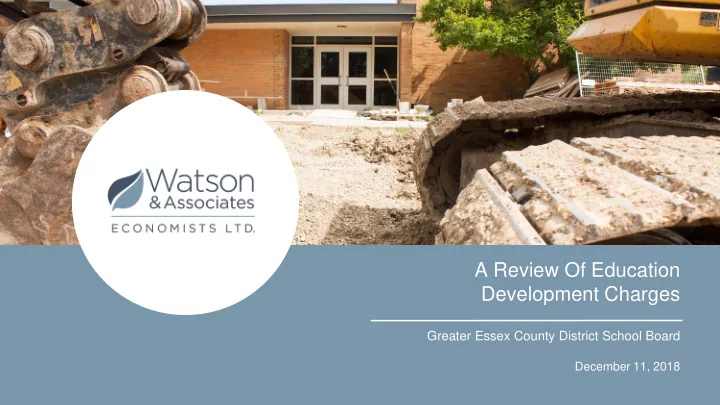

A Review Of Education Development Charges Greater Essex County District School Board December 11, 2018
The Existing Charges Education development charges are the primary source of funding site acquisition needs for a school board experiencing growth in its jurisdiction. The GECDSB has 2 existing EDC by-laws that cover the entirety of its jurisdiction. One bylaw covers Essex County/Pelee Island and one bylaw covers the City of Windsor. The by-laws have a maximum term of 5 years and were implemented in 2014. The existing charges are the same for both bylaws at $305 per residential building permit/unit. The charge is collected on a 100% residential basis.
What Is An Education Development Charge An Education Development Charge is a development charge that is imposed under a by-law respecting growth related net education land costs incurred or proposed to be incurred by a School Board. In layman’s terms this means it is a charge that is levied on new development that is paid by the developer/permit taker when the building permit is issued by the municipality. The revenue collected from the charge is then used by a school board to purchase land/school sites for new schools to be built upon.
What Does A School Board Have To Do? EDC Two Public EDC Study Prepare an Background Meetings Must Be EDC Study Must Be Must Be Available To Background Approved By Held Prior Public At Study Minister of To Passing Least 2 Weeks Before 1 st Mtg. Education A New EDC Notice Of Public Meetings Must Be Provided At Least 20 Days Prior To Said Meetings
Ministry Update • The Ministry of Education is currently reviewing the EDC legislation. • The Ministry has made recent legislative changes that have essentially ‘frozen’ EDC rates. • The Ministry expects its review to take between 6-8 months.
EDC Policies Each EDC by-law has a set of underlying policies that help determine the structure and type of by-law that will be enacted. Ministry of Education legislation states that a School Board must conduct a review of its EDC policies prior to renewing their EDC by-law. Policy decisions made by the Board play a key role in determining things like, areas to which the by-law applies, the ability to have different charges for different types of housing developments or how much of the eventual charge is to be borne by residential or non- residential development.
EDC Policies Percentage Of Growth Related Net Education Land Costs To Be Borne Through EDCs Typically Exemptions calculated to can result in collect 100% less than of education 100% of land costs collections Many school boards with existing EDC by-laws collect less than 100% of net education land costs because they have granted some form of non-statutory exemptions through negotiations with development community interests or in response to positions by local governments or other interested stakeholders.
EDC Policies Exemptions Two types of Statutory & exemptions Non-Statutory Statutory exemptions are determined through legislation and the Board does not incur a revenue loss, however a non-statutory exemption is a ‘voluntary’ exemption and the Board must absorb any associated loss of revenue/EDC funds.
EDC Policies Jurisdiction Wide Or Area Specific Charges Boards can Bylaws can be choose what jurisdiction- areas they wide or cover want the EDC only certain to cover areas The existing EDC bylaws are jurisdiction wide. However, it is important to note that the Board has 2 EDC bylaws because the Board’s jurisdiction is regarded as two separate ‘regions’ for the purposes of the EDC. Essex County/Pelee Island is considered one ‘region’ and the City of Windsor another ‘region’.
EDC Policies Percentage Of Net Education Land Costs To Be Borne By Residential And Non- Residential Development Boards can allocate up to The existing 40% of the EDC bylaw is EDC to non- 100% residential residential development EDC bylaws around the Province vary from 0% non-residential to the mid-20% range for the non- residential charge. The average around the Province is approximately 10%. The allocation of residential/non-residential splits does not affect cost recovery. Final allocations are usually discussed with stakeholders through the public consultation process.
EDC Policies Uniform Charge For All Types Of Development Vs. Differentiated Charges Boards can There are have one rate currently no for all types of EDC bylaws development with or can differentiated differentiate rates As is the case with residential/non-residential EDC rates, the determination of a uniform or differentiated rate does not necessarily impact EDC revenues. Input is sought from the public to help staff make recommendations to determine the ideal bylaw structure for the Board.
What’s Next? The new EDC Background Study and associated analysis is in process. Draft EDC – Jan/Feb 2019 First Public Meetings – April 2019 New bylaw passage consideration: April 2019
QUESTIONS?
Recommend
More recommend